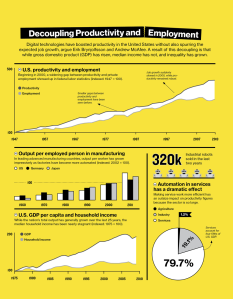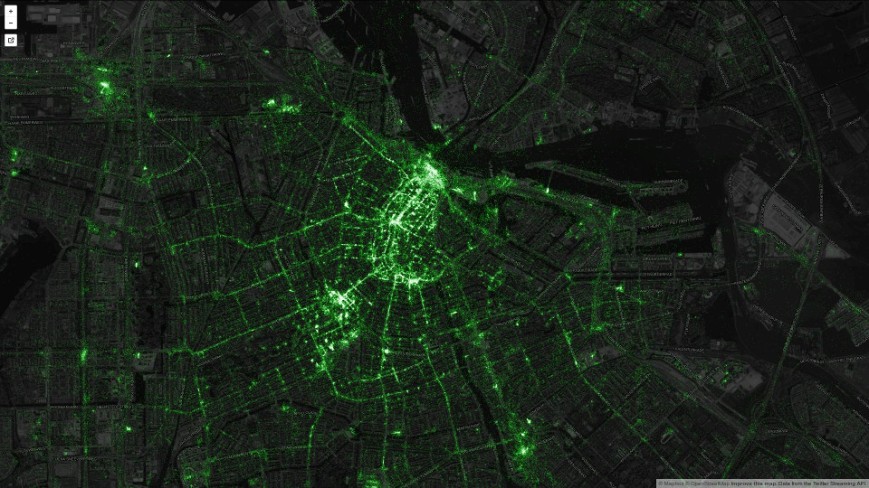Sometimes our future seems to accelerate. That wonderful car speeds ahead, and it might even leave us behind, while we think we are driving it. This is not just an image, the self driving car seems to be making its way. Where will we be? Gazing at it from the side of the street or being steered to an unknown destination? Autopilot has been flying us for some time now and not many have seen this as particularly threatening. But presently there is a lot anxiety about automation, the internet and its consequences for jobs and private lives.
The internet as economic destruction

In his book “The internet is not the answer” (2015) Andrew Keen is fiercely attacking the new companies and people that propel the internet at lightning speed. Because, as he constantly, and repeatedly says, it is destroying the livelihood of millions working in the old industries, services and offices. And it is not giving them many jobs in return. By creating virtual economic networks that cater directly for consumers through the web and the internet the new companies can work with a fraction of the employees that were busy in the buildings of the old. Who needs the hotels if you have AirBNB, who wants taxi drivers if you have Uber, who needs package delivery if you have self driving cars and drones that will bring your orders at your door? And this is only a small section of the economic sectors that are or will be effected by the new ways of commerce. And it is not just the manual labourers or the shopkeepers that will lose their job: the middle class, and the office workers are also in danger: journalists, translators, copywriters, teachers, where will you go when your knowledge is used in non human apps?
Keen is also tirelessly arguing that the new internet economy is spread with a message that is obscuring the real changes. The prophets of the new services talk about liberating people, especially from the tyranny of a ruling state, bureaucracy and wage slavery: everyone can now be a publisher, a writer, a taxi driver, a hotelier and more. By showing off your pictures, video’s or tweets in the world wide networks you can easily become a world star! Indeed, some make the headlines, some startups become million dollar companies in a short time. But Keen mainly sees a huge rise in economic inequality, the new companies like Google, Apple, Amazon are becoming the new masters. Nothing new he says, the industrial revolution also created giants that dominated their time. Capitalism, it is always renewing itself, but it will always tend toward monopolies if unchecked.
Who profits?
Many of the new internet companies are making huge profits, but others like Spotify or Instagram are not (yet) doing that, although they have millions of users and are also worth a big buck. The main revolution in the internet economy is that new products are generally free to use or ridiculously cheap: Flickr, YouTube, Google search, Facebook, you pay nothing but they give you much. How is that possible? They sell adds with their products and they mainly rely on content contributed by the users themselves or on the data the users give away while using these services. Some of them have very small staff: Instagram has some 200 employees and 75 million daily users, WhatsApp has, according to their own information, 900 million users, but only 55 engineers. In comparison, an old media company like Disney has 180,000 workers worldwide.
Besides, Keen is suggesting, they use their massive power in such ways that creators and content providers that should be rewarded don’t get much out of it. He makes this claim especially for musicians. Spotify and YouTube don’t deliver that much for the artist that are on it: according to Keen they manage to rip off the musicians with a small fee. In the meantime publishing cd’s has gone down enormously and everybody is listening or downloading music for free. One would think it could be different: I am listening to many more groups and musical pieces than ever before. I would never have heard of these musicians or bought their cd’s. And this happens worldwide. Why aren’t musicians making more from the use of their material than before? Outside the Western world I guess there will not be much control on copyright, and in the royalty negotiations many musicians don’t seem strong enough to get more out of the use of their products. Songwriters and musicians always had a hard time in negotiating good deals with the record companies. In that respect nothing much has changed. See articles in The New Yorker and The Trichordist for a discussion of this. An article in the Rolling Stone suggest that income is generated through streaming, but there are others who are more sceptic.
Alternatives
Keen has been accused of being too negative and one sided. I have heard him speak at conferences and I felt this too. Of the key actors he pays least attention to the consumers, although he does write about their involvement in the narcissistic social media world and their expectation to get information, software, music and books for free through the internet. Either they are all deluded and already part of this global ideological factory of instant gratification or some of their needs are really being served (which could amount to the same thing if you are very cynical). If you believe there is also a positive side to individual involvement, then there is also real value to be found in the ways of the internet. Keen poses the original idealistic nature against its present money hijacked state. But maybe in the information sharing, the collaborative projects and the new ways of publishing there is lots to be cherished and of real value to the world that cannot washed away that easily.
The companies that rule the internet are the main culprits in Keens story. Has he taken into account other perspectives on the changes? The internet may have a huge impact but is it always the cause of the big changes that are taking place in the economic area? The global changes in economic production that bring China and India more up front certainly have to be taken into account. The decline of many western industries is also a revolution in global economic power. And when he mourns the decline of Kodak or the music industries as quality producers, one should not forget that they made huge profits and have taken the wrong path. At Kodak the digital camera was invented, but they didn’t see the potential of it, because they clung to their old profitable ways of producing. The same one can argue for the record companies. When downloading and sharing music became popular the record companies protested but let the initiative go to Apple to put a new way of selling music on the market (iTunes). Again the same happened with streaming of music. But from the above cited articles it looks like the record companies now do manage to get a lot out of their deals with the internet companies.
The nature of state involvement is another element that needs more investigation. Keen points out that the internet never would have been there without the research funded by states, it is no company invention. They let the computer and internet companies grow relatively unchecked (although remember the actions of misuse of power against Microsoft). And now states clearly use the new possibilities of information gathering for mass surveillance. Here Keen comes with some answers to his problematic, and that is to be applauded. He puts his stakes on new control measures of states against the power and privilege of the new masters. In the afterword to the Dutch edition of his book he is rather optimistic about these state actions. Especially in the measures of the European Union he sees the beginning of a real check on the ways of the big internet companies. And he also sees some realization of the issues at stake with the companies themselves.
Keen deserves credit for posing the problems so unashamedly, even crudely, although he repeats himself many times. But the problems he identifies will probably not just be solved by curtailing the power of the global companies. I would personally say that they need to be broken up, that parts of their products that have immense value need to be secured for humanities interest and these should be dispossessed (like You Tube, the search indexes, and more, they should become our new libraries). But the states themselves cannot be trusted, they have broken up the freedoms that guarantee privacy that were laid down for the nineteenth and twentieth century parliamentary democracies. These are now in serious danger and it is a question whether they can be upheld in the old form. For the consumers privacy concerns have not been pre-eminent. But somehow the consequences of the new power over private data that companies and states have gained, will show themselves. A world wide digital rights struggle about this could lie ahead.


